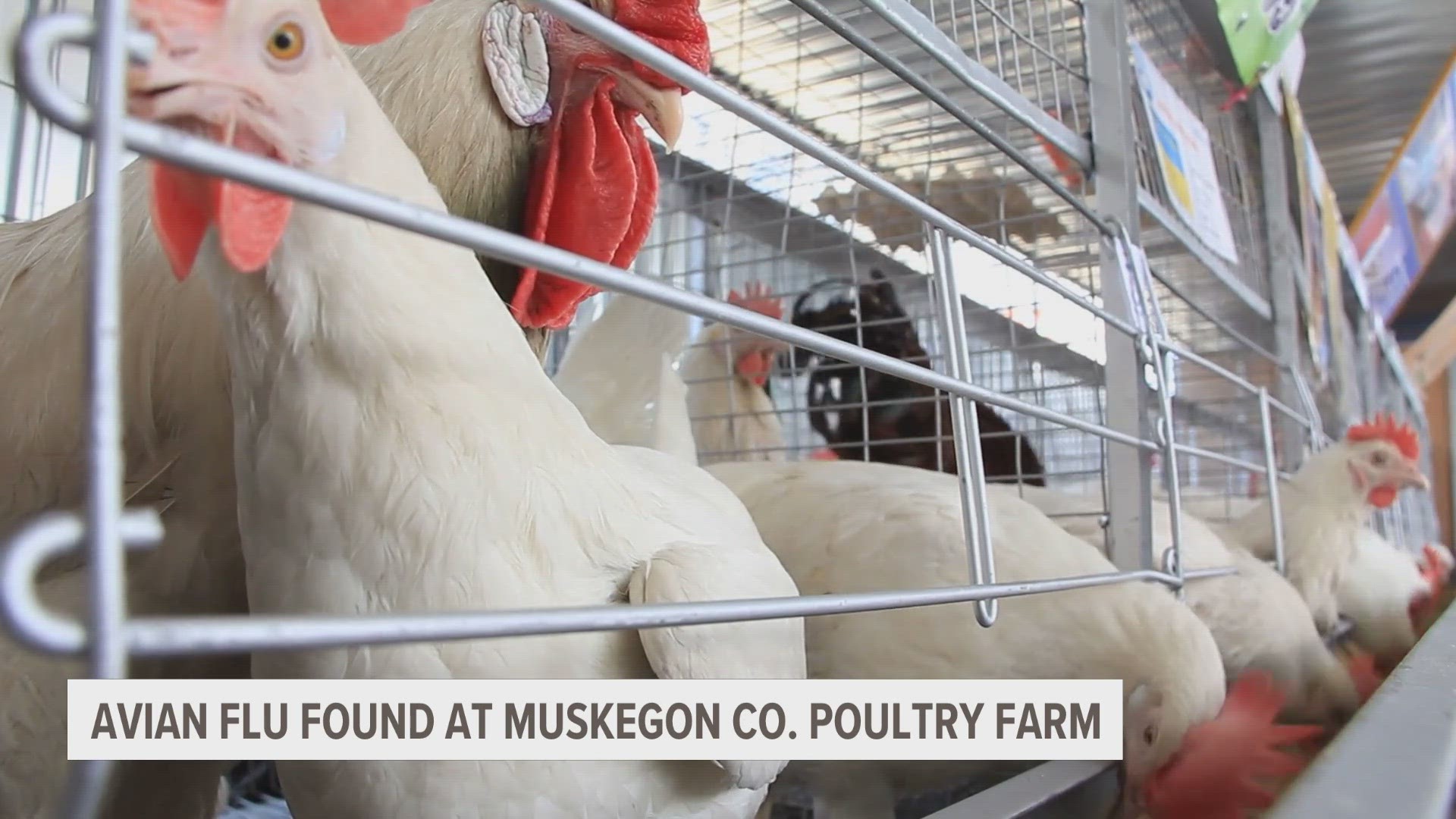MUSKEGON, Mich. — The state of Michigan said Tuesday they found Avian Influenza at a commercial poultry facility in Muskegon County.
Avian flu is said to be highly pathogenic, which means it can cause severe illness.
The bird flu was first detected in Michigan in 2022 and this is the second time it has been found in Muskegon County.
“While this latest detection is unfortunate, it is not unexpected as wild birds are still present on the landscape with the mild winter temperatures. Direct or indirect contact with infected wild birds have been the point of infection for many of the HPAI-positive flocks in Michigan,” said State Veterinarian Dr. Nora Wineland, DVM, MS, DACVPM. “The best strategy any bird owner has against this disease is prevention. It is essential to continue taking preventative measures to protect flocks from wild birds and the germs they could be carrying.”
Experts say it is often passed to poultry from wild birds that they come into contact with, however it can also be passed through contact with infected equipment or the clothing and shoes of caretakers.
The Muskegon County facility is currently under a quarantine to prevent further spread of the disease.
"Michigan's poultry farmers provide the best care for their animals by maintaining among the highest levels of biosecurity in the industry. However, HPAI can be extremely contagious and despite their best efforts, this virus finds its way to the birds,” said Dr. Nancy Barr, executive director of Michigan Allied Poultry Industries. “Events like this are every poultry farmer's worst fear. We are grateful for the partnership of our farmers, the assistance of MDARD as well as the USDA to rapidly respond to this event, helping to protect other flocks and stop the spread."
People with their own backyard chickens can also do their part by implementing simple safety protocols.
Michigan Department of Agriculture and Rural Development (MDARD) Communications Director Jennifer Holton gave some advice.
"You need to be washing your hands, doing anything that you can to mitigate the potential for the virus to come in, whether that's keeping the wild birds from integrating with their flock, I mean, we still have birds migrating, that's actually how it gets to the domestic birds, it can move on equipment, shoes, it's a fairly hardy virus," said Holton.
MDARD also shared a list of tips people who are in contact with bird can use:
- Prevent contact between domestic and wild birds by bringing them indoors or ensuring their outdoor area is fully enclosed.
- Wash your hands before and after handling birds as well as when moving between different coops.
- Disinfect boots and other gear when moving between coops.
- Do not share equipment or other supplies between coops or other farms.
- Clean and disinfect equipment and other supplies between uses. If it cannot be disinfected, discard it.
- Use well or municipal water as drinking water for birds.
- Keep poultry feed secure to ensure there is no contact between the feed/feed ingredients and wild birds or rodents
MDARD said Avian flu has very little risk to humans. Thanks to ongoing monitoring and reporting by farmers, there is no danger of it making it into the food supply.
If you need to report a possible case of Avian flu in a domestic bird you should contact MDARD immediately at 800-292-3939 (daytime) or 517-373-0440 (after-hours). If you need to report a possible case in a wild bird you can report to the DNR using their Eyes in the Field app, or calling their Wildlife Disease Laboratory at 517-336-5030.
►Make it easy to keep up to date with more stories like this. Download the 13 ON YOUR SIDE app now.
Have a news tip? Email news@13onyourside.com, visit our Facebook page or Twitter. Subscribe to our YouTube channel.
Watch 13 ON YOUR SIDE for free on Roku, Amazon Fire TV Stick, Apple TV and on your phone.

